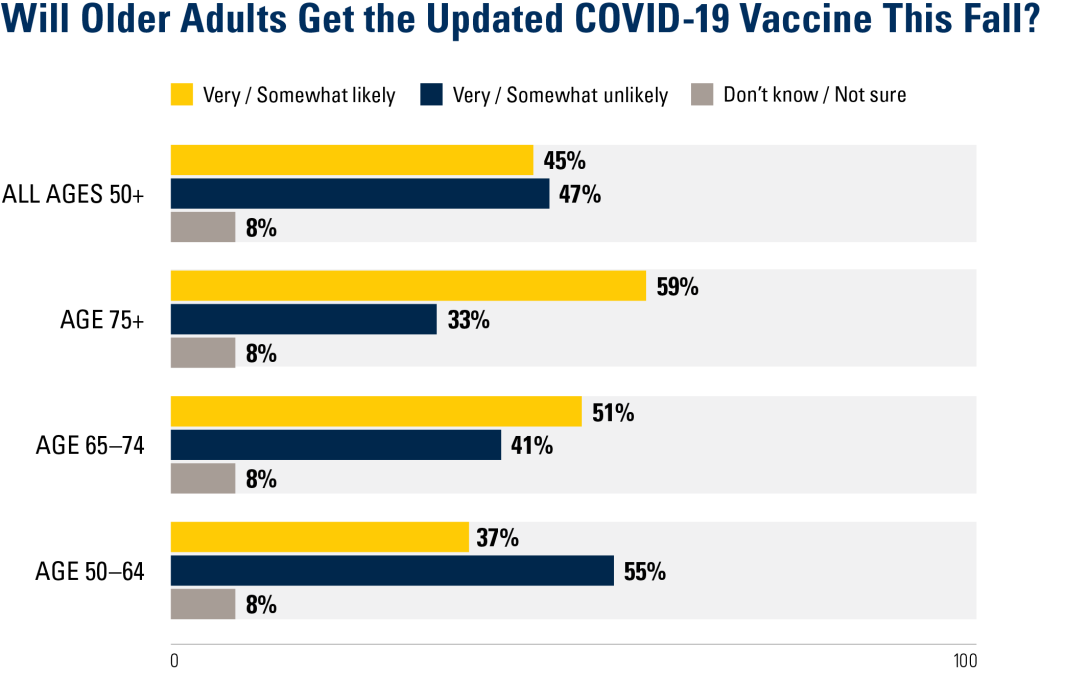Poll shows those in their 50s and early 60s, those over 50 who live with children, and other groups may need more encouragement from clinicians and other sources to get vaccinated
10:33 AM
Author |

The newly updated COVID-19 vaccine just arrived in pharmacies and clinics nationwide, and a recent poll suggests nearly half of people age 50 and older plan to get it.
But some older adults with high risk of severe illness appear unlikely to seek the vaccine, and interest varies widely by age group, education level, race and ethnicity, and other factors, the poll shows.
In all, 45% of people age 50 and older say they’re likely to get the updated vaccine, according to the new findings from the University of Michigan’s National Poll on Healthy Aging.
The data come from polling done in August 2024, just before the new vaccine was released but after it was officially recommended by the federal Centers for Disease Control and Prevention.
The poll shows the highest rate of interest in the new vaccine in the age group most at risk of severe illness and hospitalization if they catch the coronavirus: those age 75 and up.
In all, 59% of this age group said they were likely to get the updated COVID-19 shot, with 49% of them saying they’re very likely and 10% saying they’re somewhat likely.
The next youngest age group, age 65 to 74, also had a majority saying they’re likely to get vaccinated, at 51% total, including 40% who say they’re very likely.
But among those in the youngest group (50 to 64), more people said they’re unlikely to get the vaccine than said they were likely to get it, at 55% unlikely vs. 37% likely.
Across all age groups, 8% of older adults said they didn’t know or weren’t sure about whether they would get the updated vaccine.
“We know that this virus is most likely to cause severe illness in the oldest people, with people over age 75 accounting for nearly half of all COVID-19 hospitalizations since last fall, and at least 44,000 deaths of people over age 65 directly due to COVID-19 last year,” said Preeti Malani, M.D., M.S., a senior advisor to the poll and an infectious disease physician at Michigan Medicine, U-M’s academic medical center.
“The vaccine offers protection against illness, including severe illness, in people of all ages, especially those who have underlying health issues,” she added.
“Our new poll data suggest that providers and healthcare organizations need to do more to encourage older adults to get vaccinated soon, especially given the current wave of cases and the likelihood of another wave this winter.”
The poll is based at the U-M Institute for Healthcare Policy and Innovation, and supported by AARP and Michigan Medicine, U-M’s academic medical center.
Who should get the updated vaccine and why
The CDC officially recommends the updated COVID-19 vaccines for everyone over the age of 6 months.
Because of this, the vaccines are available without cost to nearly everyone at pharmacies and clinics nationwide, though private insurance plans can set the approved locations for their plan members.
Vaccines for uninsured adults may be available through local health departments and safety-net clinics.
Malani notes that vaccine manufacturers Pfizer, Moderna and Novavax have tailored the vaccines to help the body’s immune system fight off currently circulating strains of the virus that causes COVID-19.
Our new poll data suggest that providers and healthcare organizations need to do more to encourage older adults to get vaccinated soon." - Preeti Malani, M.D., M.S.
The annual updates aim to accomplish the same goal as the tailoring of the annual flu shot to reflect mutations in the influenza virus.
Both viruses mutate regularly as they travel from person to person around the world each year.
SEE ALSO: Vaccines: A few minutes now could spare you misery later
The newly updated COVID-19 vaccine replaces the one that became available last fall, which was also recommended for everyone over the age of 6 months.
Malani notes that even people who received one or more doses of last year’s vaccine should receive the new one to fine-tune their immunity.
People who had a confirmed case of COVID-19 during this summer’s wave are encouraged to wait until three months have passed before getting vaccinated with the updated vaccine.
Differences by demographic groups
Older adults with a bachelor’s degree or higher were more likely to say they’re likely to get vaccinated, at 54% compared with 41% of those with lower levels of education.
Older adults who identify as Black or Asian were more likely than those of other backgrounds to say they were likely to get vaccinated, at 52% and 49%, respectively, compared with the 44% for both Hispanic and white non-Hispanic older adults.

But Black older adults were also more likely than other groups to say they didn’t know or weren’t sure if they would get vaccinated, at 16%.
Meanwhile, 49% of white non-Hispanic older adults said they were somewhat or very unlikely to get the vaccine – the highest of all groups by as much as 17 percentage points.
The poll team also examined vaccination intentions among those people over 50 who live with children under the age of 18, whether their own children, or grandchildren or other minors.
Past research has shown in as many as 70% of situations where people catch the coronavirus from someone they live with, children are the source.
The poll finds that people over 50 who live with at least one child or teen were less likely to say they’re likely to get the updated vaccine against COVID-19 than those without children in their homes (36% vs. 46%).
In all, women were slightly more likely than men to say they’re somewhat or very likely to get the updated vaccine, and slightly more likely to say they didn’t know yet or weren’t sure.
Michigan-specific findings
In addition to the national poll data, the team also gauged vaccine interest among older adults living in Michigan, with support from the Michigan Health Endowment Fund.
Compared with older adults living in other states, Michiganders over the age of 50 were more likely to say they’re somewhat or very likely to get the updated vaccine, with 50% saying so compared with 45%.
There was also a significant difference between Michiganders based on income, with 54% in higher income households (incomes of $60,000 and above) saying they were likely to get the vaccine compared with 46% of those in households with lower incomes.
There was no significant difference by income in the national sample.
Protection for the most vulnerable
The poll does not include people who live in institutional settings such as nursing homes and long term care.
But Malani says it’s especially important to ensure that older adults living in these and other settings, such as assisted living facilities, get the new COVID-19 vaccine.
Around 19% of all COVID-related hospitalizations among people over age 65 last year were among residents of nursing homes.
“As the pandemic continues, we need to ensure that our most vulnerable have the best and most up-to-date protection they can get, which means getting all the doses recommended for them,” she said.
“In fact, people who have a health condition or take a medication that compromises their immune system can get an additional dose or doses of the new updated vaccine two months after they get their first dose.”
A full list of such conditions is available from the CDC but includes:
people currently in treatment for cancer,
those with a history of a blood cancer,
those who have gotten an organ or bone marrow transplant,
those taking high-dose steroids for any condition, and
those taking other medicines that can affect the immune system, such as injected drugs for autoimmune conditions including rheumatoid arthritis, ulcerative colitis and Crohn’s disease
Visit vaccines.gov (www.vaccines.gov/es in Spanish) to find a location for vaccination near you.
The poll findings come from a nationally representative survey conducted by NORC at the University of Chicago for IHPI and administered online and via phone in August 2024 among 3,482 adults ages 50 and older. The sample was subsequently weighted to reflect the U.S. and Michigan populations.
Read past National Poll on Healthy Aging reports and about the poll methodology.
Sign up for Health Lab newsletters today. Get medical tips from top experts and learn about new scientific discoveries every week by subscribing to Health Lab’s two newsletters, Health & Wellness and Research & Innovation.
Sign up for the Health Lab Podcast: Add us on Spotify, Apple Podcasts or wherever you get you listen to your favorite shows.

Explore a variety of health care news & stories by visiting the Health Lab home page for more articles.

Department of Communication at Michigan Medicine

Clinical Professor

Want top health & research news weekly? Sign up for Health Lab’s newsletters today!




